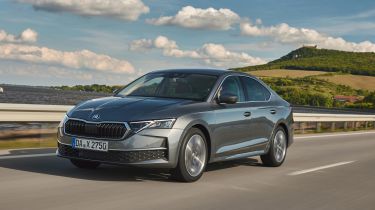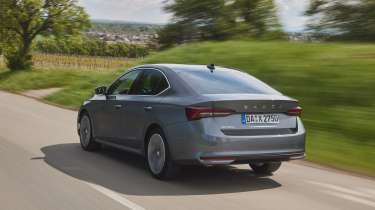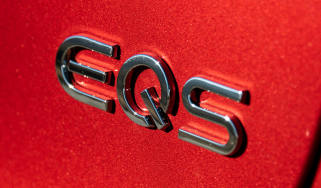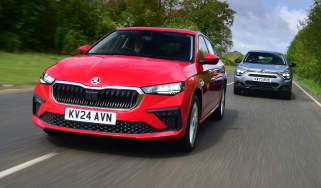New Skoda Octavia 2024 facelift review: updates strengthen a strong hand
Skoda's family car hero gets a little bit better with the latest facelift, and it was pretty good to start with.

Verdict
The updated Octavia doesn’t really do anything new, but it does manage to improve what was already one of the most well-rounded offerings out there. Comfortable (on sensible wheels), refined and still stunningly practical, it may look increasingly conventional in a world of plug-in hybrids and full EVs, but it’s still an epic family car. A worthy upgrade for existing customers? We’d say so.
The world facing the Skoda Octavia has never looked more complex – and yet, in a way, its mission statement has never been clearer. The Czech manufacturer’s most famous model is also its best seller worldwide, but as it enters its 28th year of production, it faces tougher opposition than ever – not just from traditional rivals but also, increasingly, from all-electric alternatives. So it’s time for a quick revamp, designed to see the fourth-generation hatchback (our 2021 Car of the Year) and Estate through until at least 2027.
Skoda isn’t stupid, so while the Octavia has always been accused of being one of the more conservative offerings in the family-car class, it’s not about to get radical. The familiar semi-saloon, semi-fastback shape remains, although slightly more aerodynamic bumpers mean that it’s just shy of a centimetre longer overall than before.
At the front, there’s a revised grille, a fresh bumper and new headlights that feature matrix-LED tech – enough (just about) to make this version stand out from what’s gone before. This is a midlife facelift, of course, so there are no changes along the sides, but this Octavia gets scrolling rear indicator lights for the first time. Throw in a few fresh alloy wheel designs and a new Sportline trim level – think vRS but without the performance hike and the higher insurance bills – and it adds up to a well-judged, if entirely rational exterior overhaul.
More reviews
Car group tests
- Volkswagen Golf vs Skoda Octavia: 2023 twin test review
- Peugeot 308 SW vs Skoda Octavia Estate: 2022 twin test review
In-depth reviews
Long-term tests
Road tests
- New Skoda Octavia Estate 2024 review: facelifted family wagon shines
- Skoda Octavia vRS (Mk1, 2000-2006) icon review
- New Skoda Octavia iV 2021 review
Used car tests
There are a few significant tweaks inside. All versions now get a digital-instrument display, and the central 10-inch infotainment screen has now been replaced, across the range, by a 13-inch panel. The budget hasn’t extended to a dashboard redesign, though, so the trick physical switches from the latest Kodiaq and Superb aren’t present here; you’ll still need to prod the dedicated areas of the touchscreen interface if you want to adjust the cabin temperature or turn on the heated seats. That said, this is still a better set-up than many of the Octavia’s VW Group stablemates, at least.
The engine range has been rationalised at the bottom end, with the removal of the 1.0-litre three-cylinder petrol engine. It’s replaced by a 1.5-litre four-cylinder unit with 114bhp and 220Nm of torque. It is, in effect, a detuned version of the 148bhp motor that has been the mainstay of this generation of Octavia, and that engine continues to be offered. Both of these petrols get a six-speed manual as standard, but they’re both also available with a dual-clutch seven-speed automatic that brings with it some mild-hybrid assistance.
Skoda doesn’t offer the four-wheel-drive version in the UK, but we do get a pair of diesel options (yes, a choice!) whose outputs match those of the petrols. The more potent version is a DSG auto, but without any mild-hybrid assistance.
At the top of the range, meanwhile, Skoda remains committed to vRS performance – so in time, the flagship edition (still available as a hatch and Estate) will get a hike to 262bhp and what Skoda is calling a “more powerful sound” from a tweaked sports exhaust.
Notable from its absence, though, is a plug-in hybrid option. Skoda has dropped the Octavia’s PHEV powertrain for now, although the reticence towards full electrification might yet encourage the brand to bring a more ‘transitional’ set-up back into the facelifted line-up (perhaps to sit alongside the EV estate it has committed to introducing) in the future. For the next year at least, though, your dealer will point you towards the Superb or Kodiaq if you’re a company-car chooser after a BiK-busting option.
The Octavia range starts with SE Technology, which gets 16-inch alloy wheels, heated front seats, the 13-inch screen, wireless Apple and Android integration, electrically adjustable and folding side mirrors, and a wireless smartphone charging pad. This version is available only with the lower-powered petrol, but both diesels.
SE L, meanwhile, takes the wheel size up to 17 inches and brings snazzier seat fabrics (microsuede and artificial leather), a heated steering wheel and windscreen, adaptive cruise control, keyless entry and a powered tailgate with gesture control, plus the animated indicators. You’re limited to the higher-powered petrol with this version, along with the same choice of diesels as with SE Technology.
Sportline is restricted to the 148bhp petrol motor, in either manual or mild-hybrid DSG auto form. It gets sports seats, metallic paint, 18-inch wheels, sports suspension (lowered by 15mm) and gloss-black styling elements, along with what Skoda calls ‘progressive dynamic steering’.
Here, we’re driving the new entry-level petrol (which Skoda expects to account for just over one in four of all Octavias sold in the UK) in manual-gearbox form, and in a European trim level that’s roughly equivalent to SE Technology but with a few key upgrades.
First impressions are positive; there wasn’t a great deal amiss with the old car’s cabin finish and quality, but everything feels a smidgen more plush and a little more polished. Our example has the recycled fabric (an option on SE Technology) and it looks every bit as smart as the supposedly posher microsuede that you get further up the range – particularly in the door inserts, where its light-grey colour brightens up the otherwise-sombre environment.
The fascia remains a bastion of usability, with sensible, big switches in the centre, escaping the feeling that the 13-inch screen is dominating proceedings. That display is undeniably huge but it’s positioned in a pretty central position vertically, so you shouldn’t feel like you need to peer over the top of it.
Fire up the new engine and it instantly settles to a smoother idle than the old triple, whose slightly gruff note was a constant reminder that you’d bought the cheapest Octavia possible. The rest of the control weights feel as neatly judged as before, with perhaps slightly heavier steering the only obvious difference – although our test car’s optional 18-inch wheels may have been having an effect on this. There’s a slight snatchiness from the brake pedal but in general this is an easy car to drive smoothly – helped by one of the slickest manual gearboxes in the VW Group.
The engine retains its politeness on the move, although there’s no doubt that the reduced output means that you will have to work it harder and use the gearbox more to keep things spinning nicely. The motor does its best work north of 2,000rpm, frankly, and it won’t thank you for being asked to pull from lower than that in a higher gear. Fortunately you can drive around this, and the note from under the bonnet remains smooth enough to around 3,500rpm. Beyond that it gets a little thrashy, but you shouldn’t need to go there unless you’re performing a slightly ambitious overtake. And in the meantime, the engine fades away nicely on motorways.
This slightly relaxed gait is replicated in the Octavia’s handling, for this remains one of the most comfort-focused offerings in the class. The handling is safe and true rather than interesting or involving, but this means it’s possible to thread this large hatchback down narrower, more twisty roads with the minimum of fuss. You shouldn’t be too bothered by bumps and potholes, either, although larger 18-inch wheels don’t help the ride quality, in truth. We’d avoid the slightly fidgety feeling by sticking with the standard rims.
What hasn’t changed is the Octavia’s trump card: practicality. Its wheelbase is unaltered, but it was longer than pretty much any rival’s anyway, so there’s tons of rear legroom and, even with the relatively shallow hatchback rake, decent headroom.
The boot is colossal too, with 600 litres on offer in the hatchback, expandable to 1,555 litres if you fold down the rear seats. If that’s not enough, these capacities grow to 640 litres and 1,700 litres if you pick the Estate model.
And of course the Octavia is stuffed with neat ‘life-enhancing’ touches, like the umbrella in the driver’s door armrest and the usual ice scraper in the fuel-filler flap. These are well-known features, but they’re as worthy today as they were five years ago – much like the Octavia itself, in fact.
| Model: |
Skoda Octavia SE Technology 1.5 116PS |
| Price: | From £26,775 |
| Powertrain: |
1.5-litre 4cyl turbo petrol |
| Power/torque | 114bhp/220Nm |
| Transmission: |
Six-speed manual, front-wheel drive |
| 0-62mph: | 10.4s |
| Top speed: | 126mph |
| Fuel economy: | 50-54mpg |
| CO2 emissions: | 119-129g/km |
| Dimensions (l/w/h): |
4,698/1,829/1,486mm |
| On sale: | Now |







